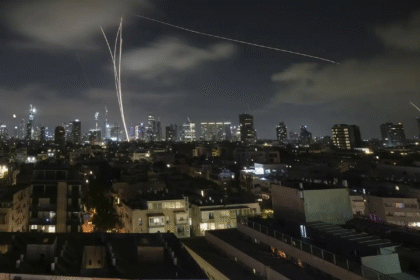“I Would Rather Starve Than Die for Aid”: Eman Hillis’s Story and Gaza’s Cry for Help
Eman Hillis isn’t just another voice from Gaza. She is one of the few still standing, still writing, still speaking when so much of the world has gone quiet. In a recent article published by Al Jazeera, she offered a deeply moving, painfully honest account of life in northern Gaza. Her words weren’t poetic or dramatic—they were raw, plain, and urgent.
What she wrote was not fiction. It was not an appeal for sympathy. It was the unfiltered truth from someone who wakes up every morning unsure if she’ll survive the day. She wrote about hunger—not the kind you feel before lunch, but the kind that makes your body ache and your mind blur. She wrote about fear—not from distant explosions, but from standing in line for food and wondering if you’ll be gunned down before your turn comes.
And in the middle of that story, she wrote something that stopped readers in their tracks:
“I would rather starve than take aid from the Gaza Humanitarian Foundation (GHF).”
Let that sink in. In a place where food is nearly gone, where clean water is rare, where hospitals are running without medicine or electricity, Eman Hillis has chosen to starve rather than walk to an aid center. Why? Because seeking help has become as dangerous as staying hungry.
Aid That Comes With a Target on Your Back
To the outside world, “aid” might sound like hope. But in Gaza, it has taken on a darker meaning. The Gaza Humanitarian Foundation, a private aid distribution initiative working under Israeli supervision, has been at the center of controversy for months. While its mission is to provide food and supplies, its presence has become synonymous with danger.
Eman describes how, in Rafah, people approaching GHF aid trucks were met with bullets. Children, women, and elderly people have died trying to collect flour or canned goods. It’s not an isolated incident. Human rights groups, including UN agencies, have raised the alarm about the weaponization of aid—how access is tightly controlled, monitored, and often withheld. In the worst cases, it becomes a trap.
This is why Eman refuses to take that route. Not because she doesn’t need help, but because going to an aid center might be a death sentence. In her words, the “aid” looks more like a form of control than compassion.
A City Starving in Silence
The situation in northern Gaza is beyond desperate. Since the war escalated, Israel has imposed a near-total blockade. Basic supplies have been cut off. Fuel has run dry. Bakeries have stopped working. Parents melt herbs in water and tell their children it’s soup. People chew on animal feed. Some drink brackish water, knowing it could make them sick—but what other choice do they have?
The United Nations has warned that a famine is imminent. In May alone, more than 5,000 children were hospitalized due to acute malnutrition. And that’s just the official figure—many more are suffering at home, unseen and unheard.
International aid convoys face delays, restrictions, and arbitrary denials. Most NGOs have pulled out or are working at minimal capacity due to safety concerns. The little aid that does reach Gaza rarely makes it to the north. And even when it does, people like Eman often choose not to risk it.
The world may not be watching anymore, but the suffering has not stopped.
Why Refusing Aid is a Statement of Dignity
Eman’s choice might sound strange to someone far away from war. Why refuse food when you’re starving? But her answer is layered.
“It’s not just about hunger,” she writes. “It’s about being treated like a human being.” The GHF aid centers, often guarded by Israeli soldiers or monitored by drones, make many Palestinians feel like criminals instead of civilians in need. You don’t just get food—you get watched, threatened, or worse.
So Eman stays away, even if that means surviving on tea, herbs, or nothing at all. It’s not pride. It’s a cry for dignity in a world that has all but stripped her of it.
A Generation Raised on War and Fear
Eman is part of a generation that has known more war than peace. She’s seen entire neighborhoods flattened. She’s walked past the rubble of schools and mosques. She’s grown up under air raids, blockade, and international indifference.
But she’s also a storyteller. And right now, her story is not just hers—it’s the story of thousands of Palestinians in Gaza.
From the elderly who can’t run fast enough when bombs fall, to the newborns who won’t remember a world without destruction, the entire Palestinian population is being dehumanized. And as the world scrolls past headlines, people like Eman are left to document their own erasure.
Where is the World?
One of the most painful parts of Eman’s story is not just the hunger or fear—it’s the silence from the rest of the world. Once, Gaza drew global protests and diplomatic outrage. Today, it’s often reduced to a geopolitical “problem,” rarely humanized.
Eman’s article was a reminder that this is not about politics. This is about people.
Mothers. Students. Artists. Teachers. Nurses. Children.
And now, the people of Gaza are begging—not just for food, but for recognition. For humanity. For someone to care.
The Human Cost of Dehumanization
What Eman Hillis’s story reveals is a hard truth: when you dehumanize people long enough, you begin to ignore their suffering. When you label them as threats, numbers, or collateral damage, you forget they cry, they dream, they bleed.
And so, she writes.
From a corner of Gaza where few journalists remain, where aid is a risk and hope is scarce, Eman chooses to tell the truth. Not to be brave, but because silence is worse. Because being invisible is a second kind of death.
A Final Plea
Eman doesn’t ask for your pity. She doesn’t ask you to pick a side.
She asks you to look at what is happening—to see Gaza. To remember that hunger is not a weapon. That dignity is not a luxury. That aid should never come at the cost of your life.
She is not alone in her refusal. Many others in Gaza are making the same heartbreaking decision: to starve with dignity rather than die while being humiliated.
And if the world hears that and still turns away—then perhaps we’ve all forgotten what it means to be human.
Also Read: Why India Overlooked the Zohran Mamdani Story: A Missed Political Moment







